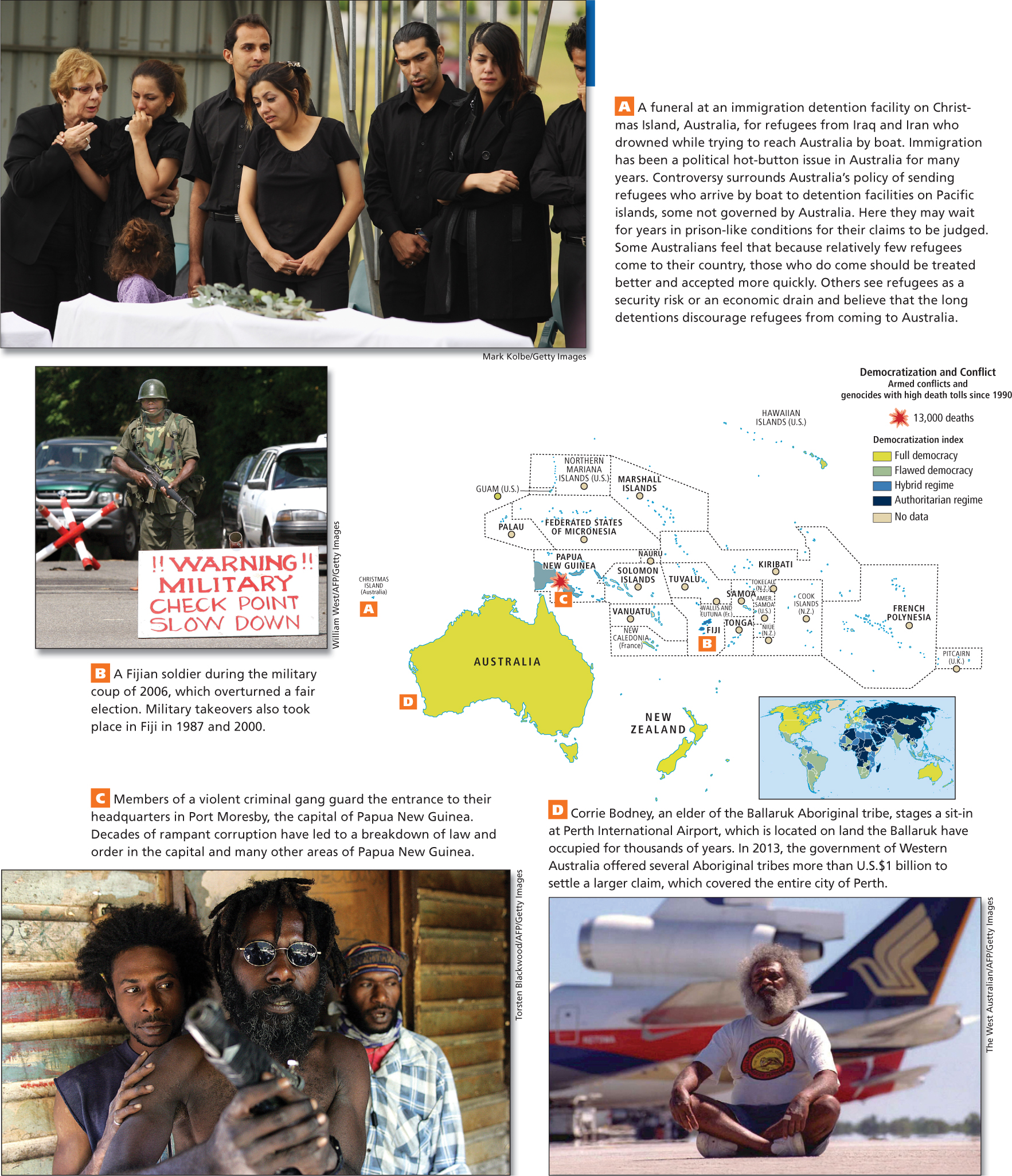11.6 POWER AND POLITICS
GEOGRAPHIC INSIGHT 3
Power and Politics: In recent decades, stark divisions have emerged in Oceania over definitions of democracy—
Democracy as it is practiced in Australia and New Zealand is a parliamentary system based on universal voting rights for adults, debate, and majority rule. The Pacific Way is based on traditional notions of power and problem solving and refers to a way of settling issues familiar to many Pacific Islanders. It favors consensus and mutual understanding over open confrontation, and respect for traditional leadership (especially the usually patriarchal leadership of families and villages) over free speech and other political freedoms. As such, the Pacific Way can embody very different definitions of fairness and corruption than parliamentary systems.
Pacific Way the regional identity and way of handling conflicts peacefully that grows out of Pacific Islanders’ particular social experiences
As a political and cultural philosophy, the Pacific Way developed in Fiji around the time of Fiji’s independence from the United Kingdom in 1970. It subsequently gained popularity in many Pacific islands, most of which gained independence in the 1970s and 1980s. The Pacific Way carries a flavor of resistance to Europeanization and has often been invoked to uphold the notion of a regional identity shared by Pacific islands that grows out of their unique history and social experience. It was particularly influential among educators given the task of writing new textbooks to replace those used by the former colonial masters. The new texts focused students’ attention away from Britain, France, and the United States and toward their own cultures. Appeals to the Pacific Way have also been used to uphold attempts by Pacific island governments to control their own economic development and solve their own political and social problems.
In politics, the Pacific Way has occasionally been invoked as a philosophical basis for overriding democratic elections that challenge the power of indigenous Pacific Islanders. In 1987, 2000, and 2006, indigenous Fijians used the Pacific Way to justify coups d’état against legally elected governments (Figure 11.17B). All three of the overthrown governments were dominated by Indian Fijians, the descendants of people from India whom the British brought to Fiji more than a century ago to work on sugar plantations.

THINKING GEOGRAPHICALLY
Use the Photo Essay above to answer these questions.
Question 11.16
A When did Australia’s whites-
Question 11.17
B In Fiji, three coups d’état carried out by indigenous Fijians have removed legally elected governments headed by which ethnicity?
Question 11.18
C How might corruption constrain political freedoms?
Question 11.19
D Before 1993, why were Aborigines assumed to have no prior claim to land in Australia?
Fiji’s population is now about evenly divided between indigenous Fijians and Indian Fijians. Indigenous Fijians are generally less prosperous and tend to live in rural areas where community affairs are still governed by traditional chiefs. Indian Fijians, in contrast, hold significant economic and political power, especially in the urban centers and in areas of tourism and sugar cultivation. In response to the coups, many Indian Fijians left the islands, resulting in a loss of badly needed skilled workers that has slowed economic development.
Political responses around Oceania to the Fiji coups have been divided. Australia, New Zealand, and the United States (via APEC and the state government of Hawaii) have demanded that the election results stand and the Indian Fijians be returned to office. But much of Oceania has referenced the Pacific Way in arguments supporting the coup leaders. As in Fiji, those who govern many of the Pacific islands are leaders of indigenous descent who have not always had the strongest respect for political freedoms, especially when their hold on power is threatened. Their decisions have at times upheld traditional Pacific values such as stability, respect for authority, and certain kinds of environmental awareness, while at other times contributing to corruption and civil disorder (see Figure 11.17C).
On the global stage, Fiji has been suspended from the Commonwealth of Nations (a union of former British colonies) for subverting majority-
ON THE BRIGHT SIDE
The Value of the Pacific Way to Grassroots Sustainability
Regardless of its global political status, the Pacific Way is likely to endure, especially as a concept that upholds regional identity and traditional culture. Further, some organizations now use the Pacific Way as the basis of an integrated approach to economic development and environmental issues. For example, the South Pacific Regional Environmental Programme builds on traditional Pacific island economic activities—
THINGS TO REMEMBER
GEOGRAPHIC INSIGHT 3
Power and Politics In recent decades, stark divisions have emerged in Oceania over definitions of democracy—
the system of government that dominates in New Zealand and Australia— versus the Pacific Way, a political and cultural philosophy based in the traditional cultures of the Pacific islands. The Pacific Way, a political and cultural philosophy, was developed in Fiji around the time of Fiji’s independence from the United Kingdom in 1970.
In politics, the Pacific Way has occasionally been invoked as a philosophical basis for overriding democratic elections that challenge the power of indigenous Pacific Islanders.
Governance in Oceania is for the most part based on democratic principles with regular elections; however; traditional power holders have staged coups that have negated or threatened political freedoms.